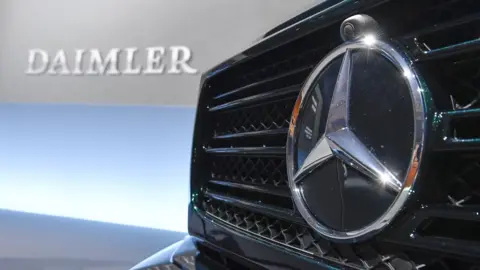BMW and Daimler invest €1bn in new car venture
 Getty Images
Getty ImagesBMW and Daimler have unveiled a joint venture covering new-generation services such as driverless vehicles, ride-hailing, and pay-per-use cars.
Normally fierce rivals, the firms are investing €1bn (£880m) in the project, which will also help drivers find parking and electric charge points.
It comes as carmakers face competition from mobility services providers such as Uber and other technology firms.
The two German firms said they were open to buying tech start-ups.
Established ride-hailing firms have been expanding. China's Didi Chuxing aims to expand its business in Latin America and Uber is growing rapidly in the US market.
"Further co-operation with other providers, including stakes in start-ups and established players, are also a possible option," Daimler's chief executive Dieter Zetsche said.
Both companies have been working to develop autonomous car technology. Many analysts have argued that to survive against the tech giants, traditional car manufacturers must develop services based on usage rather than sales.
Daimler's Car2Go car-sharing brand will be combined with BMW's DriveNow, ParkNow and ChargeNow businesses, with both carmakers holding a 50% stake in the venture.
The new joint venture has five strands:
- Reach Now: a smartphone-based route management and booking service
- Charge Now: expanding electric car charging
- Free Now: for taxi ride-hailing
- Park Now: dedicated to offering parking services
- Share Now: for car-sharing.
Harald Krüger, chairman of BMW's management board, said: "These five services will merge ever more closely to form a single mobility service portfolio with an all-electric, self-driving fleet of vehicles that charge and park autonomously,"
The venture would be "a key cornerstone in our strategy as a mobility provider," he said, adding: "The co-operation is the perfect way for us to maximize our chances in a growing market, while sharing the investments."

Analysis: Theo Leggett, business correspondent
The car industry is changing rapidly. BMW and Daimler have concluded that for them, there's safety in numbers.
As cities become more congested, and efforts to contain pollution are stepped up, their inhabitants are going to come under more pressure to give up their cars for alternative forms of transport. Owning your own set of wheels in town may one day be seen as terribly 20th Century.
At the same time technology is developing at a breakneck pace. As both Daimler and BMW have admitted, it's likely that cars in cities will eventually be shared-use electric machines that drive themselves and can be summoned at the touch of a smartphone.
Old-fashioned carmakers that fail to adapt risk being driven out of business - as car sales fall, and the tech industry upstarts move in.
The deal between the big German brands should help them cement their stake in this brave new world where car companies give way to "mobility providers".
The amount of shared investment isn't huge - a mere €1bn, and the initial focus on fairly mundane offerings such as car sharing, ride hailing and parking.
But the big question is, where it could lead?
